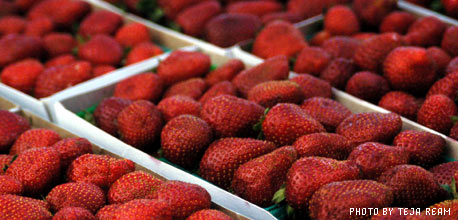 Guest post by Eleanor Athens
Guest post by Eleanor Athens
The science of taste is complex and amazing, as anyone who has ever bitten into a sun-warmed tomato in a summer garden can tell you. Much of the enjoyment we get from eating is actually caused by volatile aroma chemicals; we smell our food as we taste it. We can detect over 10,000 odors, versus only five taste classifications. That’s why eating’s just not as much fun with a stuffy nose.
But why?
Why do fruits and herbs smell this way? Is it for our enjoyment? Well, maybe, but for them it’s also a matter of survival of the species. Have you ever wondered why you’re in the garden admiring untouched fruit that needs just one more day to be perfectly ripe, and the next day you go out and someone (beast or bug) has gotten there first? Fruits want to be eaten. They broadcast themselves across your garden. We may have to hold a strawberry up to our human noses in order to smell it, but to animals, it’s crying out with a chemical signal: “Come and get it!” In the desire to propagate the species, plants offer up their fruit as delicious little sacrifices, so the seed can spread far and wide.
Unlike fruit, herbs aren’t begging to be eaten; far from it. The fragrance of herbs is in their essential oils, the aromatic essence of the plant. The essential oils often contain chemicals that are distasteful to insects and other animals (though not to us). This is one of the theories behind companion planting. The tasty fragrance of herbs is partly a result of the complex chemical warfare plants wage to survive. For example, borage and basil planted with your tomatoes deter hornworms, and the menthol content in mints and the citronella in lemon balm and lemongrass repels many insects.
Getting the most from your fragrant foods
Fruit, like cheese, releases its fragrance best at room temperature. Think of the sun-warmed tomato, all its yummy aroma chemicals floating free — as opposed to one straight from the icebox, scent deadened by the cold. If you’re serving a cheese plate for dessert, it’s a good idea to take the fruit and cheese out of the refrigerator just before dinner.
Prolonged heat can denature fragile aroma chemicals, which is why it’s preferable to add tender herbs such as parsley and cilantro at the end of cooking. Woody herbs such as rosemary and thyme stand up much better to extended cooking times.
Don’t be afraid to play with your food. Handling releases the volatile chemicals. Crush herbs in your fingers or rub your thumb over a peach, and inhale. Remember, without fragrance there’s no flavor.
– – –
Eleanor Athens is the founder of Athens Atelier, an organic perfumery. Athens Atelier fragrances are made from pure essential oils and absolutes following the tradition of aromatherapy and the modern science of aromachology; that scents have the power to make us feel good.
Teja Ream is an art grad student living in California in a studio apartment covered in mandevilla. When 9 years old she was convinced she had a special talent for growing things and decided to let the world know by painting her thumb green. Later when she washed off the paint, there was a perceptible green stain that had managed to seep into her skin, which she took as a sign from a higher being that she was destined for botanical greatness…still working on that, need help with orchids.